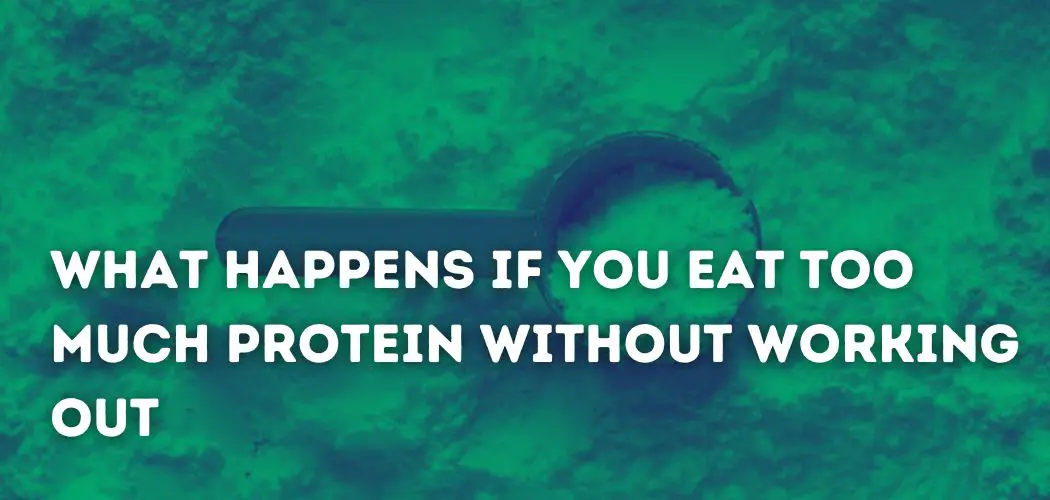Protein is an essential nutrient that is important for many bodily functions, including building and repairing tissues, producing enzymes and hormones, and supporting immune function.
Protein is an important part of a healthy diet, but consuming too much of it without working out can have negative effects on your health.
Here are some of the potential consequences of eating too much protein without exercising:
Contents
Increased Risk Of Weight Gain
When you consume more protein than your body needs, the excess protein is stored as fat.
Consuming excessive amounts of protein without working out can lead to weight gain, which can increase your risk of developing obesity-related health conditions such as diabetes, heart disease, and certain types of cancer.
Increased Strain On The Kidneys
When you consume too much protein, your kidneys have to work harder to remove the waste products generated by protein metabolism. Over time, this can lead to kidney damage or even kidney failure, especially in people with pre-existing kidney problems.
Dehydration
Eating too much protein without working out can lead to dehydration because protein metabolism requires water.
When your body doesn’t have enough water to support protein metabolism, it can lead to dehydration and other health problems such as headaches, fatigue, and constipation.
Increased Risk Of Osteoporosis
Consuming too much protein without working out can lead to an imbalance in the body’s calcium levels.

When protein is metabolized, it releases acidic byproducts that can cause the body to excrete more calcium, which can weaken bones over time and increase your risk of developing osteoporosis.
Digestive Issues
Eating excessive amounts of protein without working out can lead to digestive issues such as constipation, bloating, and diarrhea. This is because protein requires more water and digestive enzymes to break down and can slow down the digestive process if consumed in excess.
Causes Bad Breath
Eating protein without working out is unlikely to directly cause bad breath. Bad breath, also known as halitosis, is often caused by poor oral hygiene, gum disease, and the buildup of bacteria in the mouth.
However, consuming excessive amounts of protein can lead to the buildup of ketones in the body, which can cause a fruity or metallic odor on the breath.
This is more likely to occur when following a low-carbohydrate, high-protein diet such as the ketogenic diet, which can increase the production of ketones in the body.
Additionally, consuming high-protein foods such as red meat and dairy products can increase the amount of sulfurous compounds in the mouth, which can contribute to bad breath.
However, as long as you maintain good oral hygiene and consume protein as part of a balanced diet, it is unlikely that eating protein without working out will directly cause bad breath.
Consuming too much protein without working out can have negative effects on your health, including an increased risk of weight gain, kidney damage, dehydration, osteoporosis, and digestive issues.
It’s important to consume protein in moderation as part of a balanced diet that includes other essential nutrients, and to engage in regular physical activity to support overall health and well-being.
As always, it’s important to consult with a healthcare professional before making any significant changes to your diet or lifestyle.
Ideal Consumption
The ideal consumption of protein can vary depending on a variety of factors, including age, gender, weight, activity level, and overall health status.
However, the general recommended daily intake of protein is around 0.8 grams per kilogram of body weight for adults. For example, if you weigh 70 kilograms (154 pounds), your recommended daily intake of protein would be around 56 grams per day.

However, for people who are physically active, such as athletes and bodybuilders, the recommended daily intake of protein may be higher, ranging from 1.2 to 2 grams per kilogram of body weight.
This is because protein is important for building and repairing muscle tissue, and the body requires more protein when engaging in strenuous physical activity.
It’s important to note that consuming excessive amounts of protein can be harmful to your health, and can put strain on your kidneys and liver.
Therefore, it’s important to consume protein as part of a balanced diet that includes a variety of other essential nutrients, such as carbohydrates, healthy fats, vitamins, and minerals.
Can It Cause Heart Disease?
Consuming a high amount of protein without engaging in physical activity is unlikely to directly cause heart disease. However, consuming excessive amounts of protein can lead to an increased risk of heart disease if it leads to a diet high in saturated fat and cholesterol.
For example, many high-protein foods, such as red meat, cheese, and butter, are also high in saturated fat and cholesterol, which are known risk factors for heart disease.

Therefore, it’s important to consume protein as part of a balanced diet that includes other essential nutrients, and to choose lean protein sources such as fish, poultry, legumes, and low-fat dairy products.
It’s also important to note that some high-protein diets, such as the ketogenic diet, can increase the levels of LDL (“bad”) cholesterol in the blood, which can contribute to the development of heart disease.
Therefore, it’s important to consult with a healthcare professional before starting any new diet or making significant changes to your diet.
Conclusion
Protein is an essential nutrient that plays a vital role in building and repairing muscle tissue, maintaining healthy bones, and supporting a healthy immune system.
While consuming protein without engaging in physical activity is unlikely to directly cause health problems such as bad breath or heart disease, it’s important to consume protein as part of a balanced diet and to choose lean protein sources to support overall health and well-being.
The ideal consumption of protein can vary depending on individual factors such as age, gender, weight, and activity level.
By consuming protein in moderation and making healthy dietary choices, you can support your body’s needs and maintain good health.

